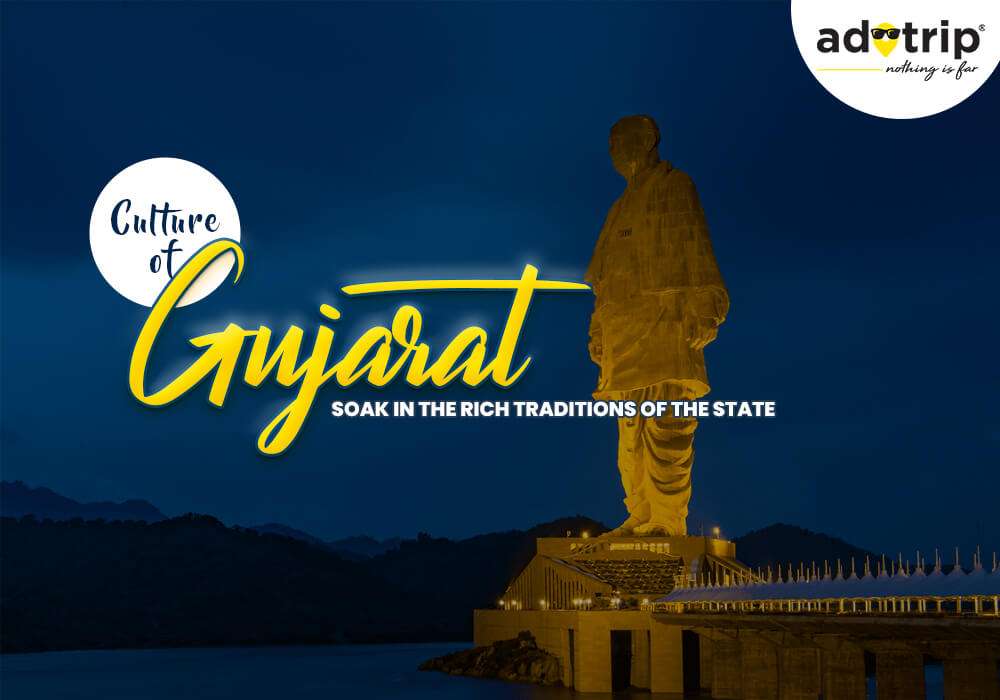
Last Updated At: 31-May-2024
Culture and Traditions Of Gujarat
Gujarat, an extraordinarily active and diverse state, substantially contributes to India's cultural landscape. The Gujarati people are a thriving society due to their innate simplicity and friendliness. Gujarati culture, its vivid art, architecture, and tradition are all easily seen in the day-to-day activities of the residents. Gujarat's diversity results from the ethnic groups that make up its people, especially Indic and Dravidian communities.
Gujarati Culture and Traditions
Gujarat's culture is a mesmerising tapestry that captures the essence of its people and traditions with its vibrant festivals, traditional dances like Garba, delectable cuisine, complex handicrafts, and architectural wonders, including the stepwells.
- Culture of Gujarat. Gujarat's Cultural Tapestry
- Festivals of Gujarat. Enthusiastic Crowds Enjoying Music
- Traditional Attire of Gujarat. Colourful Fabrics with Timeless Designs
- Cuisine of Gujarat. A Platter of Diverse Specialities
- Folk Dances of Gujarat. Graceful and Rhythmic Folk Dances
- Historical Sites of Gujarat. Exploring the Architectural Splendors
- Rann of Kutch. The Wide and Breathtaking Rann Utsav Festival
- Bhavnath Mahadev Fair. A Look into the Energetic Bhavnath Mahadev Fair
- Saputara Hills. A Picturesque View of the Gujarati Hill Town
- Bhujodi Handicrafts. A City Renowned For Its Outstanding Handicrafts
- Modhera Sun Temple. A Stunning Old Temple Consecrated to the Sun
- Gir Forest National Park. Wildlife at Its Best
- Tarnetar Fair. The Traditional Cultural Extravaganza
- Gujarati Folk Music. Traditional Musicians Playing the Dholak and the Flute
1. Culture of Gujarat | Gujarat's Cultural Tapestry
Gujarat has a rich culture woven from customs, celebrations, and artistic expressions. Gujarat welcomes diversity with open arms and is well known for its vibrant clothing, mouthwatering cuisine, and energetic traditional dances. It is a captivating location for culture fans thanks to its historical sites, which include old temples and architectural wonders that highlight the region's rich cultural legacy.
2. Festivals of Gujarat | Enthusiastic Crowds Enjoying Music
Navratri, a nine-night dance festivals of Gujarat honouring the goddess Amba, is one of the most well-known holidays observed in this area. The kite festival, Uttarayan, which fills the skies with a riot of colours and eager participation, is another important holiday. Another popular destination is the Rann Utsav in Kutch, where visitors congregate to view the captivating white salt desert. These celebrations showcase the zeal and vivacity of the Gujarati people.
3. Traditional Attire of Gujarat | The Dresses of Gujarat During Festive Occasions
The traditional attire in Gujarat clothing reflects the state's thriving and diverse culture. Women frequently don the elegant and vibrant Garba dress, which consists of a tight-fitting shirt, a flared skirt, and intricately embroidered and mirror-worked chaniya choli. The traditional outfit is frequently completed by men wearing a dhoti and a kediyu, a traditional kurta.
4. Cuisine of Gujarat | A Platter of Diverse Specialities
Gujarati food is renowned for its distinctive taste combinations, delicious vegetarian dishes, and multicultural influences. It offers an extensive selection of foods that are both savoury and nourishing. Gujarati cuisine is a culinary feast, with everything from the well-known Gujarati thali, a filling dinner made up of a variety of curries, lentils, rotis, and rice, to delectable snacks like dhokla, khandvi, and fafda. The liberal use of spices, including mustard, cumin, and turmeric.
5. Folk Dances of Gujarat | Graceful and Rhythmic Folk Dances
During Navratri, men and women gracefully circle a central lamp while accompanied by traditional music and rhythmic clapping. This is known as the Garba, one of the most famous folk dances in Gujarat. Dandiya Raas is a different well-liked dance in which couples dance while smacking wooden sticks. Bhavai, Tippani, and Hudo are examples of other folk dances; they all feature distinctive movements, attire, and storytelling aspects that reflect the vibrant traditions of Gujarat.
6. Historical Sites of Gujarat | Exploring the Architectural Splendours
Gujarat, a state in western India, is well known for its impressive architectural marvels and rich historical past. It has some illustrious historical sites that draw tourists from all over the world. The Sabarmati Ashram, where Mahatma Gandhi resided throughout the Indian independence movement, is a testament to peace and nonviolence. The Rani Ki Vav stepwell, the Sun Temple in Modhera, and the historic city of Lothal are some further notable locations that highlight historical sites in Gujarat.
7. Rann of Kutch | The Wide and Breathtaking Rann Utsav Festival
The massive salt marsh, The Rann of Kutch in Gujarat, India, turns into an eerie white landscape during the dry season. It is an extraordinary and captivating natural phenomenon that draws tourists and wildlife lovers. The area is a well-liked tourism destination due to its lively handicrafts and rich cultural heritage.
8. Bhavnath Mahadev Fair | A Look into the Energetic Bhavnath Mahadev Fair
Gujarat, India, hosts the Bhavnath Mahadev Fair, a prominent religious celebration. Thousands of worshipers come to the Bhavnath Mahadev Temple to celebrate this festival, offering prayers and participating in traditional ceremonies to honour Lord Shiva. The fair is a fascinating cultural experience because of its lively ambience, which features fairs, folk performances, and a sense of spiritual devotion.
9. Saputara Hills | A Picturesque View of the Gujarati Hill Town of Saputara
India's Saputara Hills, known for their picturesque splendour and tranquil ambience, are captivating. These fantastic hills, situated in the Western Ghats and offering breathtaking views, luxuriant flora, and comfortable weather, are well-liked tourist attractions. Trekking, kayaking on Saputara Lake, and learning about tribal culture are all available to visitors.
10. Bhujodi Handicrafts | A City Renowned For Its Outstanding Handicrafts
Gujarat's Bhujodi village is well known for its excellent handicrafts and rich artisanal history. Expert hands weave beautiful traditional fabrics renowned for their elaborate needlework and colourful patterns. Visitors swarm to Bhujodi to observe the artistry and buy actual handmade textiles representing local culture.
11. Modhera Sun Temple | A Stunning Old Temple Consecrated to the Sun
India's Modhera Sun Temple, Gujarat, is a stunning example of Hindu architecture. It was constructed in the eleventh century and is known for its exquisite sculptures and elaborate carvings honouring the sun deity. Both tourists and history buffs are attracted to it.
12. Gir Forest National Park | Wildlife at Its Best
The Gir Forest National Park in Gujarat, India, is a refuge for anyone who enjoys the outdoors and wildlife. It is well known for housing the last remaining Asiatic lions and serving as a vital refuge for their preservation. Other wildlife species can be found in this diversified ecosystem, which makes it a popular location for ecotourism and wildlife safaris.
13. Tarnetar Mela | The Traditional Cultural Occasion
Every year at Tarnetar village in Gujarat, a spectacular cultural spectacle known as the Tarnetar Fair is held. It is observed in September and features vibrant folk dances, handicrafts, traditional arts, and a charming matchmaking ceremony that draws both locals and visitors.
14. Gujarati Folk Music | Traditional Musicians Playing the Dholak and the Flute
Gujarati Folk Music is an expressive and lively style of traditional music that reflects the state's rich cultural past. It includes a wide variety of musical genres, such as Garba, Dandiya Raas, and Sugam Sangeet, as well as Bhavgeet and Bhavana. The songs often celebrate different holidays and occasions and are distinguished by their rhythmic beats, melodic melodies, and profound lyrics.
Are you considering travelling to Gujarat? If so, you've come to the perfect place because Adotrip can always ease your travels. So why are you still waiting? Call right away.
Book Gujarat Tour Packages
Frequently Asked Questions about the Culture of Gujarat
Q1. What are the major festivals celebrated in Gujarat?
A1. Gujarat, an Indian state, annually observes some colourful and culturally significant festivals. The nine-night dancing festival Navratri, the festival of lights Diwali, the kite-flying festival Uttarayan, and the three-month-long Rann Utsav celebration of Kutch culture are just a few essential holidays observed in Gujarat. Gujarat's colourful customs and celebrations are showcased throughout these festivals, drawing visitors worldwide.
Q2. Can you tell me about the significance of Navratri and Garba in Gujarat's culture?
A2. In Gujarati tradition, the holiday of Navratri is essential because it commemorates the triumph of good over evil. It entails worshipping the Hindu goddess Durga for nine nights. The traditional folk dance, Garba, is essential to the Navratri celebrations. People congregate in elaborately adorned circles, dance while wearing traditional garb, and make rhythmic movements. Garba promotes neighbourhood cohesion and protects Gujarati's cultural heritage.
Q3. Are there any unique dance forms or performing arts that originate from Gujarat?
A3. Gujarat, a state in western India, has a rich cultural legacy and has given the world some distinctive dance styles and performing arts. Garba is a peculiar dancing style that uses circular motions, rhythmic clapping, and bright clothes. Dandiya Raas is a well-known dance that is performed using ornamented sticks. Bhavai, a traditional folk theatre style, also features lively narrative and acrobatic gestures. These artistic manifestations are excellent examples of Gujarat's creativity and cultural variety.
Q4. How does the handicraft industry contribute to Gujarat's cultural heritage?
A4. The handicraft industry primarily preserves and promotes Gujarat's rich cultural legacy. The state's unique traditions and artistic abilities are reflected in the fine handcrafted goods made by skilled artisans. They ensure the regularity of cultural practices by preserving traditional designs and age-old techniques through their craftsmanship.
Q5. What are some traditional musical instruments associated with Gujarat's culture?
A5. Gujarat's indigenous musical instruments, which enhance its musical legacy, are deeply ingrained in its culture. Gujarati folk music commonly uses instruments such as the dhol, manjira, Jantar, shehnai, and bhungal. These musical instruments provide a unique flavour to Gujarat's cultural musical environment by adding to the energetic and vibrant rhythms of Garba, Dandiya, and other traditional dance styles.
Q6. Can you provide an overview of the colourful attire and costumes worn in Gujarat?
A6. Gujarat, a lively state in India, displays an extensive tapestry of colourful clothing and costumes. The predominant attire is the "kurta" and "dhoti" for men, while the "chaniya choli" is for women. These ensembles showcase the state's rich cultural past with elaborate embroidery, mirror work, and colourful designs.
Q7. Are there any architectural marvels or heritage sites that reflect Gujarat's culture?
A7. Many architectural wonders and heritage buildings may be found in Gujarat, a state in western India which elegantly reflects its diverse culture. The lovely stepwell architecture at the Rani ki Vav, a UNESCO World Heritage Site, is embellished with fine sculptures. Beautiful architectural designs may be found in the Dwarkadhish Temple and the Sun Temple in Modhera. Additionally, Ahmedabad's Sabarmati Ashram, linked to Mahatma Gandhi, is an important cultural and historical site in Gujarat.
Q8. How does the culinary tradition of Gujarat represent its cultural identity?
A8. Gujarat's strong cultural identity is reflected in its broad range of vegetarian cuisine and distinctive flavours, which make up its rich culinary legacy. The simplicity, healthfulness, and inventive use of ingredients like lentils, vegetables, spices, and a hint of sweetness in many recipes are all characteristics of Gujarati cuisine.
Q9. Are there any specific customs or traditions followed in Gujarati weddings?
A9. Gujarati marriages are distinguished by their colourful and happy ceremonies. Some particular customs and traditions include the Mandap Mahurat pre-wedding rite, where the bride's family asks for blessings for a happy marriage. The principal rituals include exchanging garlands, tying the "Mangalsutra" holy thread, and taking the seven vow-reflecting steps around the sacred fire. Traditional dances, music, and a lavish feast round out the festivities.
Q10. How can tourists or visitors immerse themselves in the vibrant culture of Gujarat?
A10. By visiting historical sites like the Sabarmati Ashram and Champaner-Pavagadh Archaeological Park, participating in vibrant celebrations like Navratri and the International Kite Festival, enjoying Gujarati cuisine, and interacting with local artisans to learn traditional crafts including Bandhani along with Patola weaving, visitors and tourists can fully immerse within Gujarat's lively culture.
--- Published By Adotrip
Latest Blogs
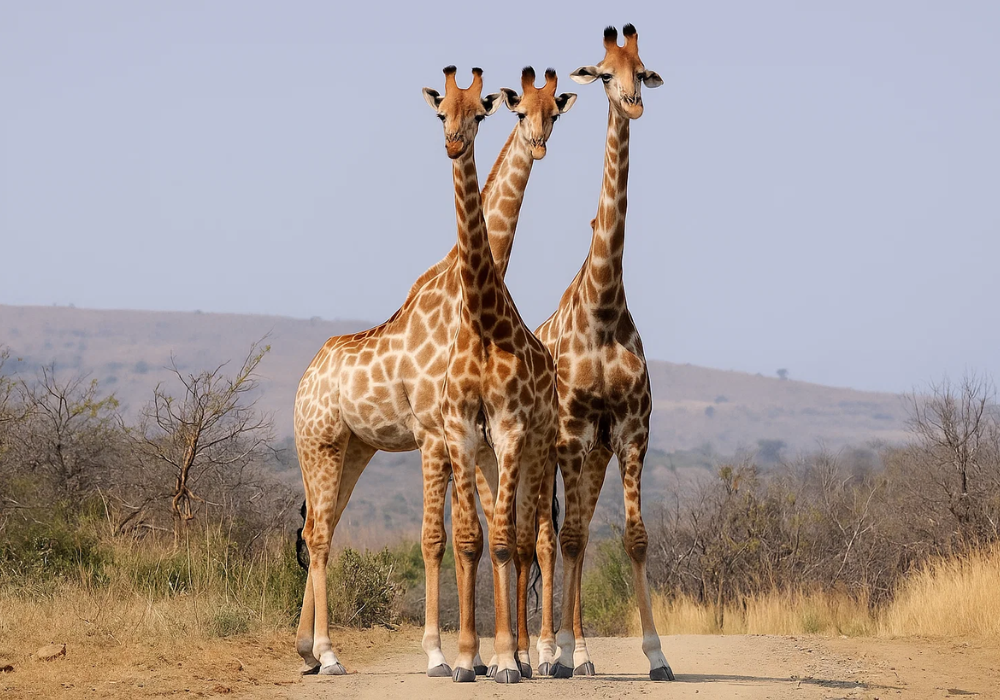
Cash in the Wild: My Safari Adventure Across Kenya with Only...
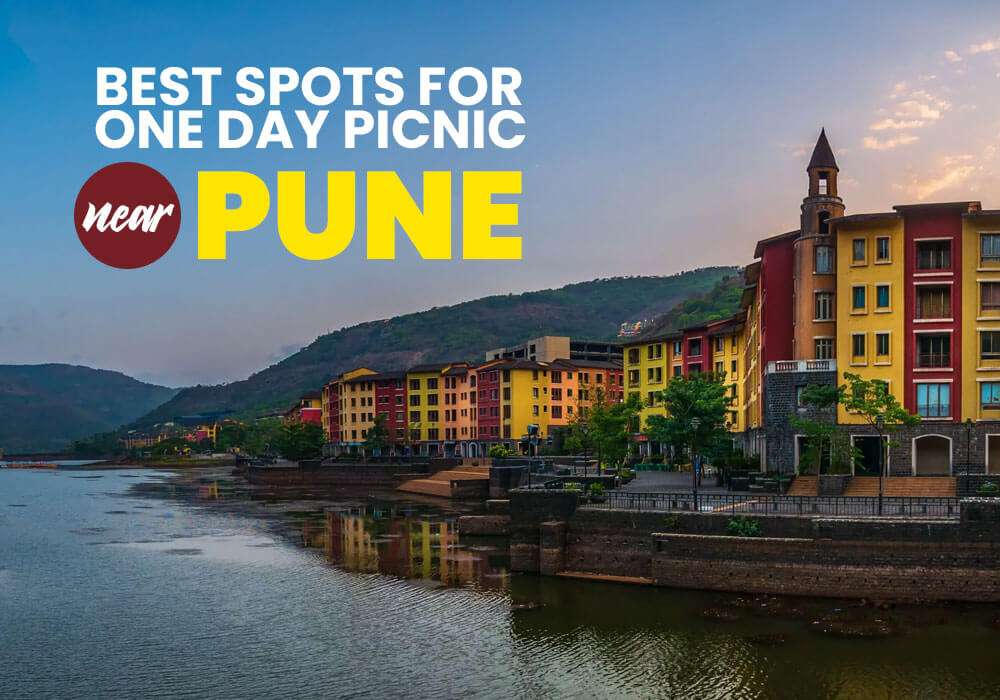
One Day Picnic Spot Near Pune - Adventure, Trekking and Natu...
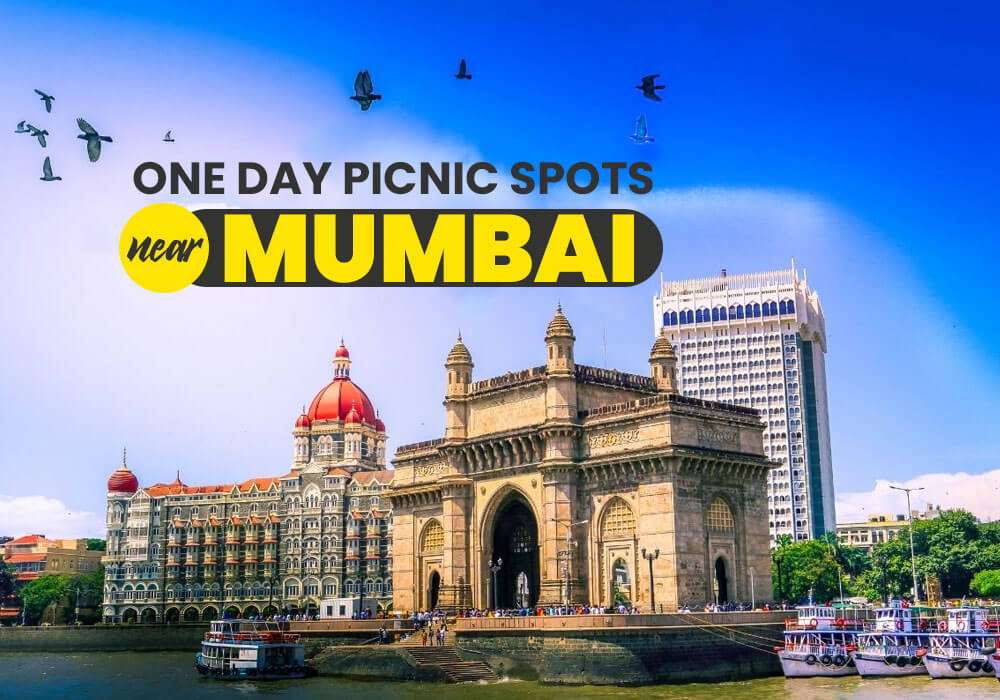
One Day Picnic Spots Near Mumbai - Monsoon, Adventure, Beach...
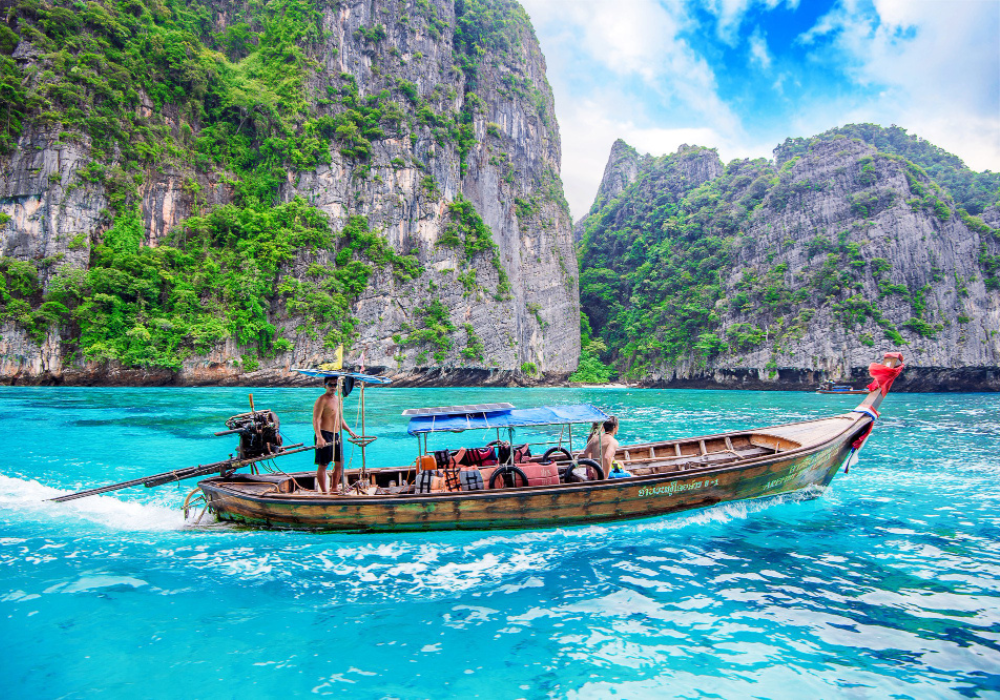
The Best Places to Go in Thailand in 2025
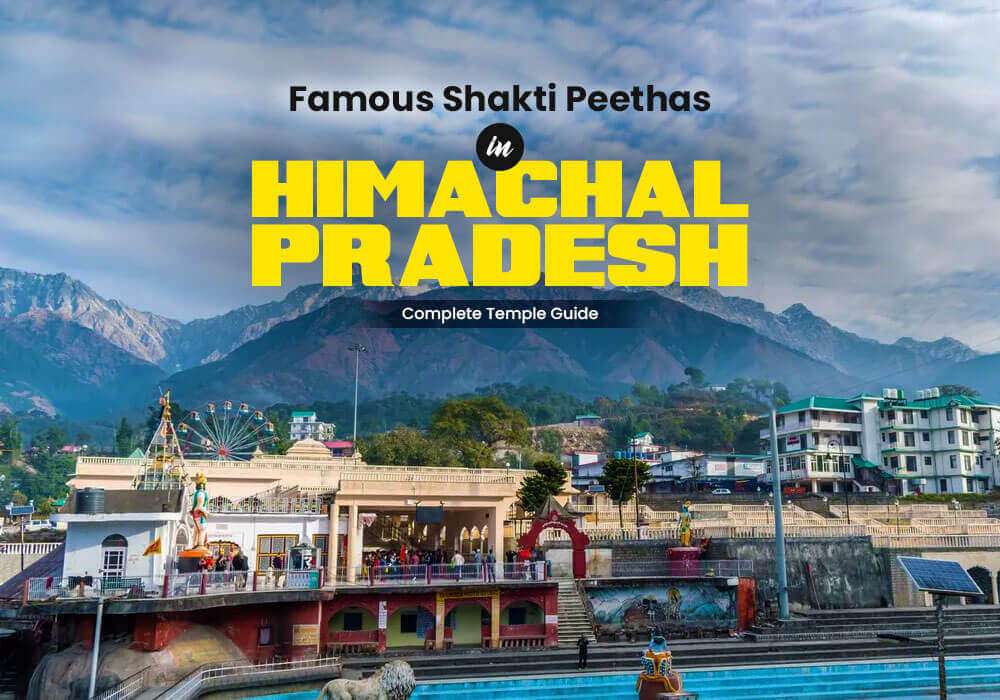

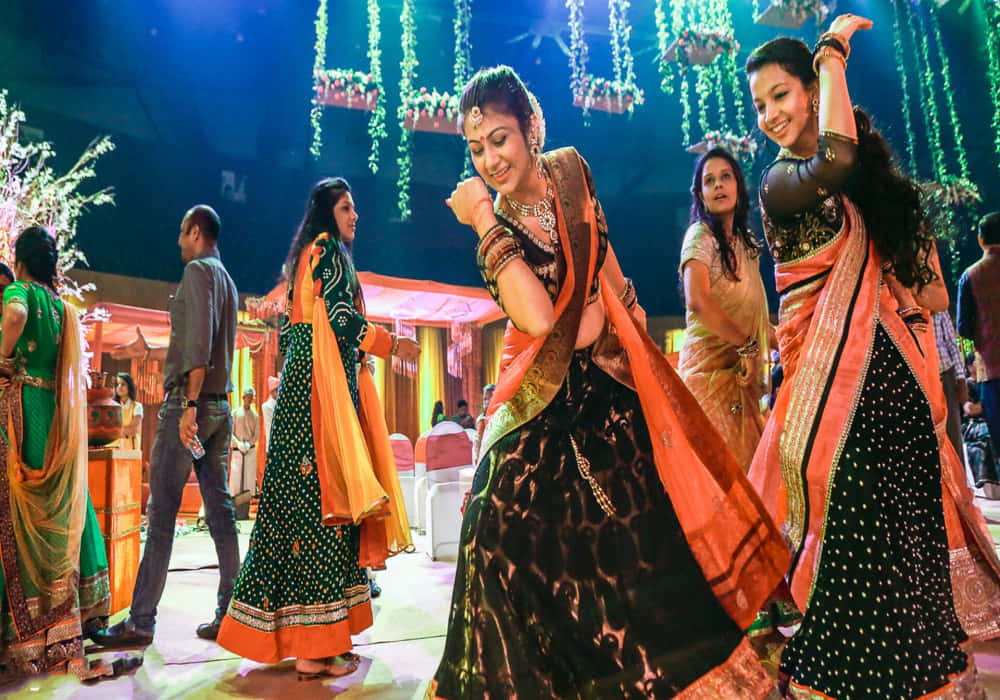
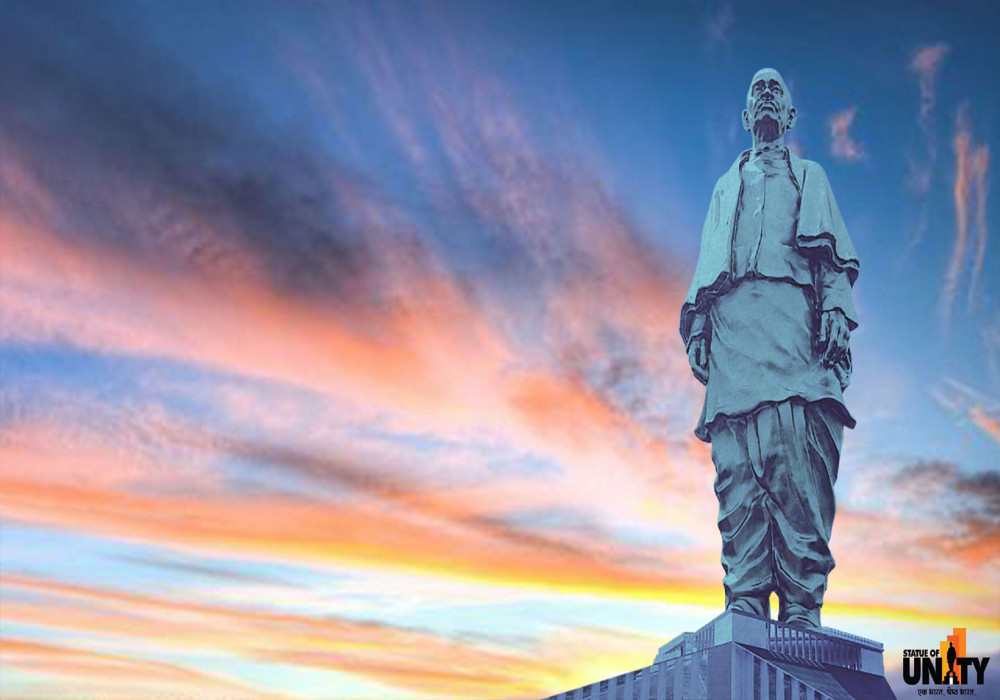
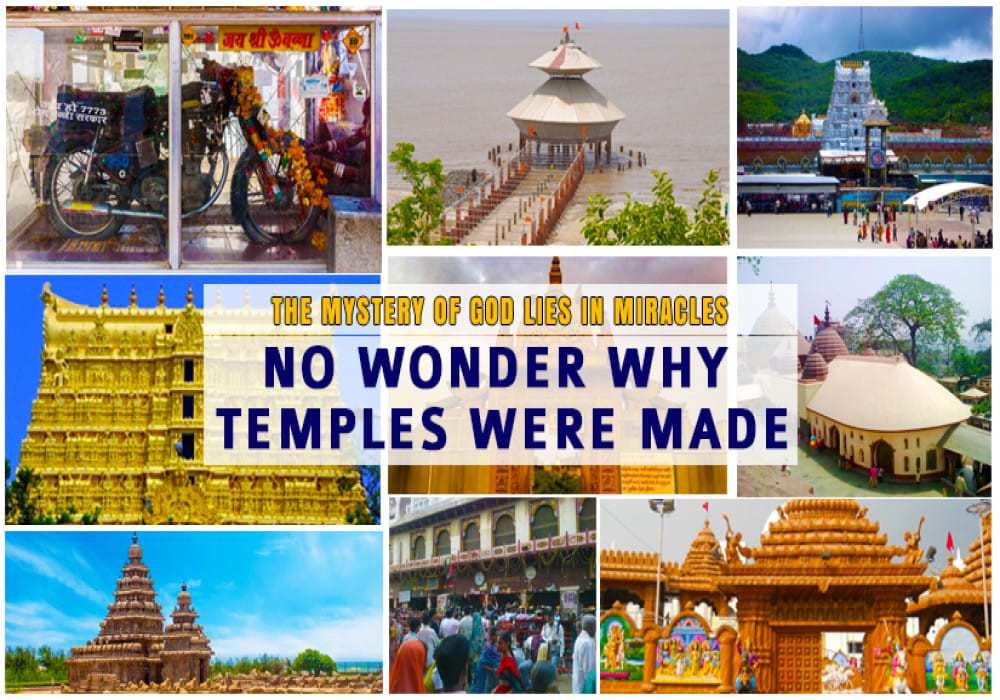
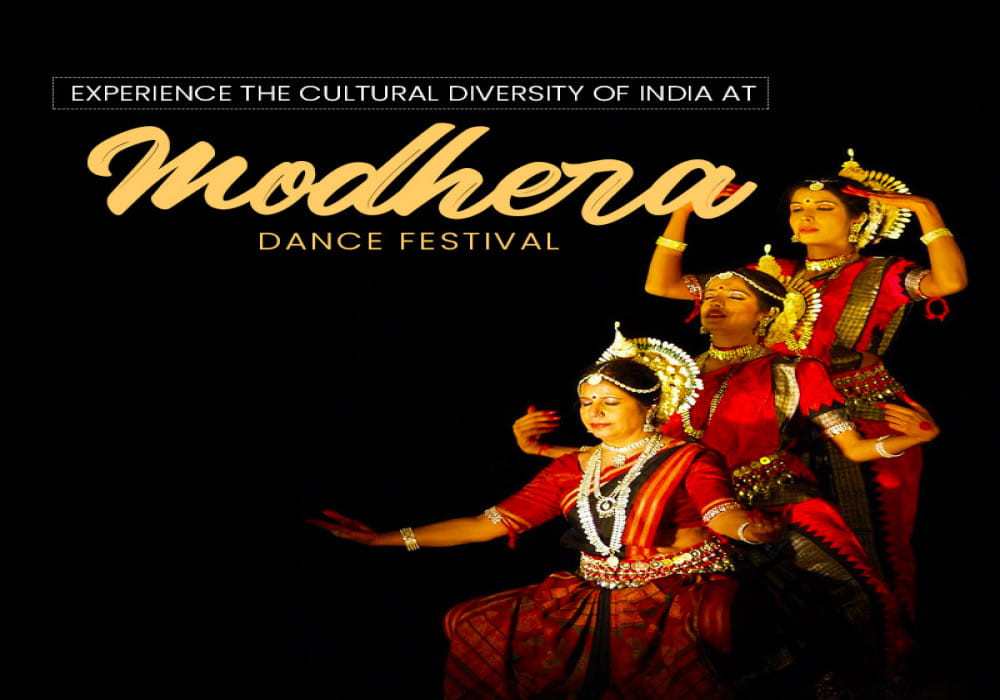
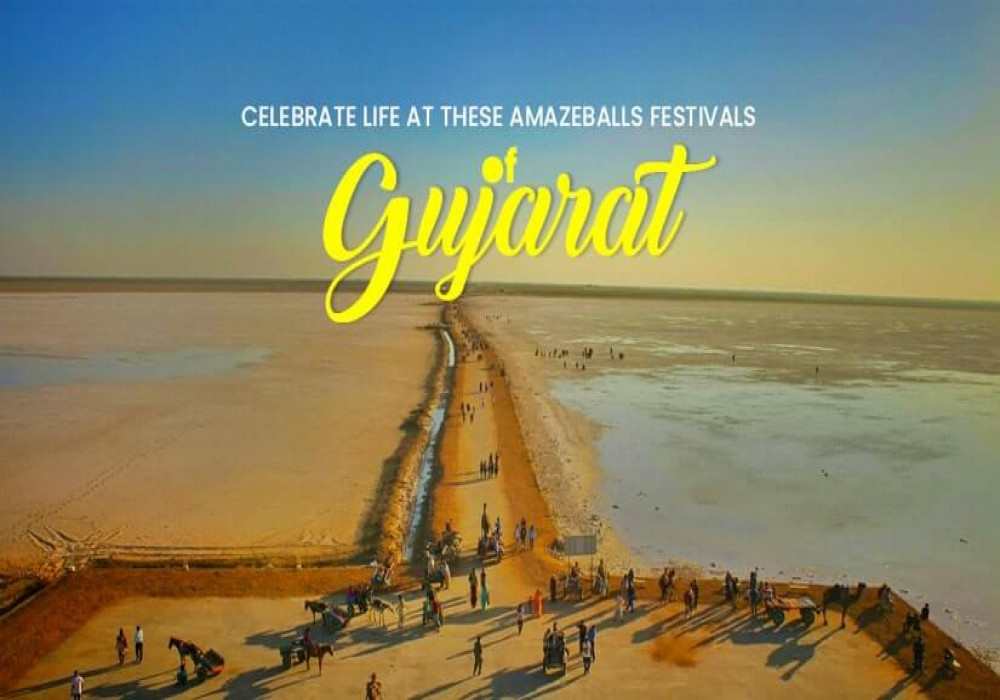
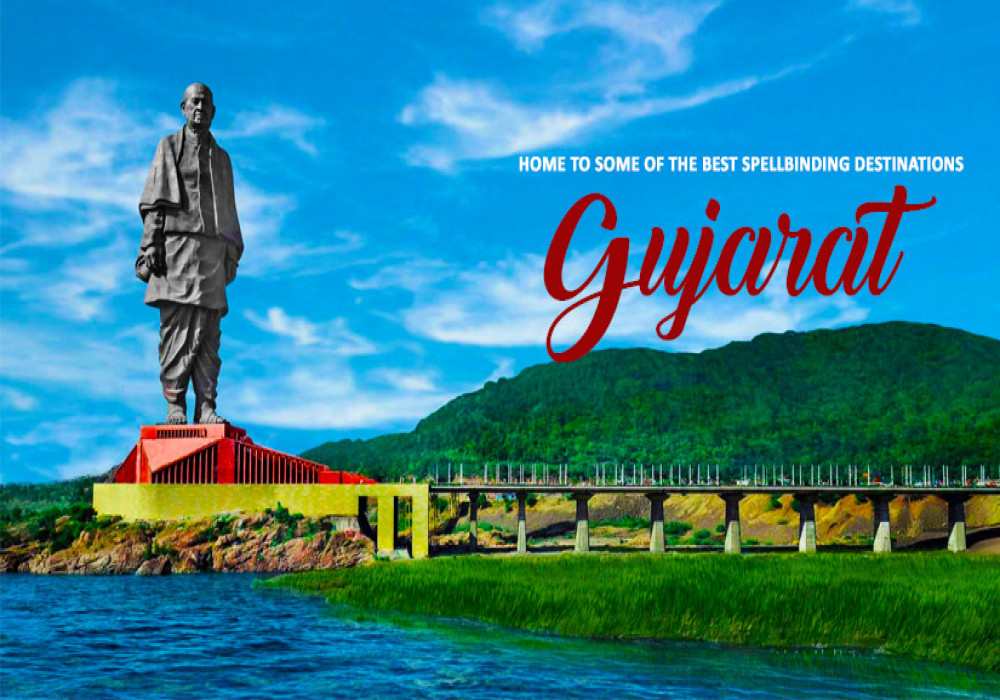

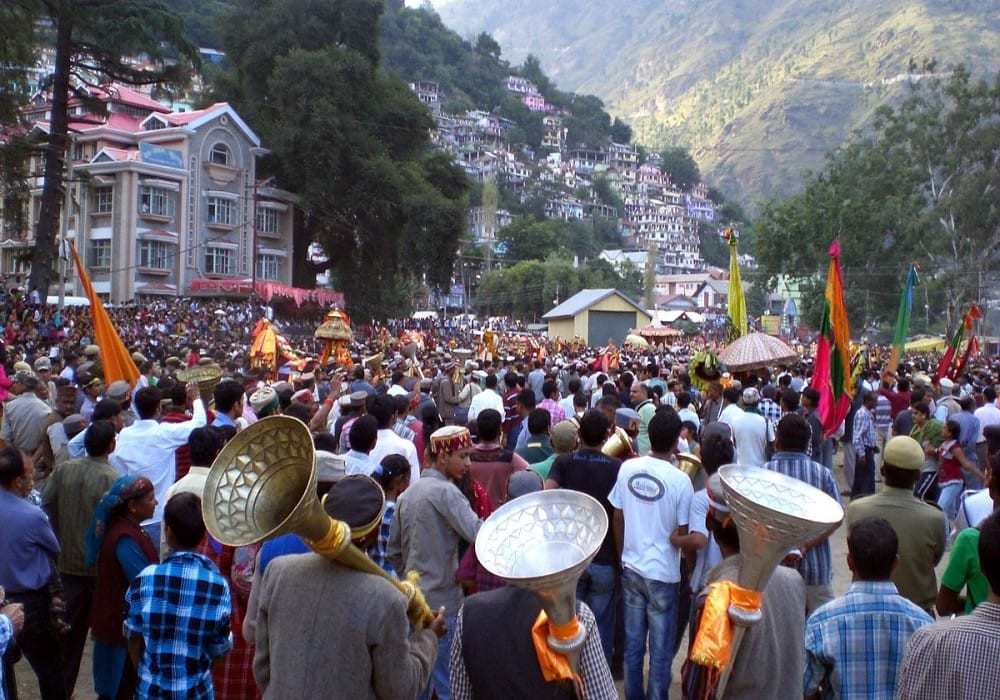


.jpg)
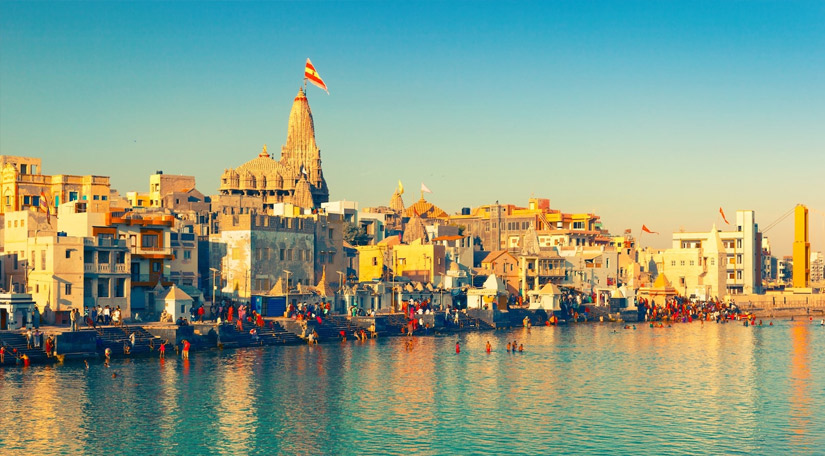
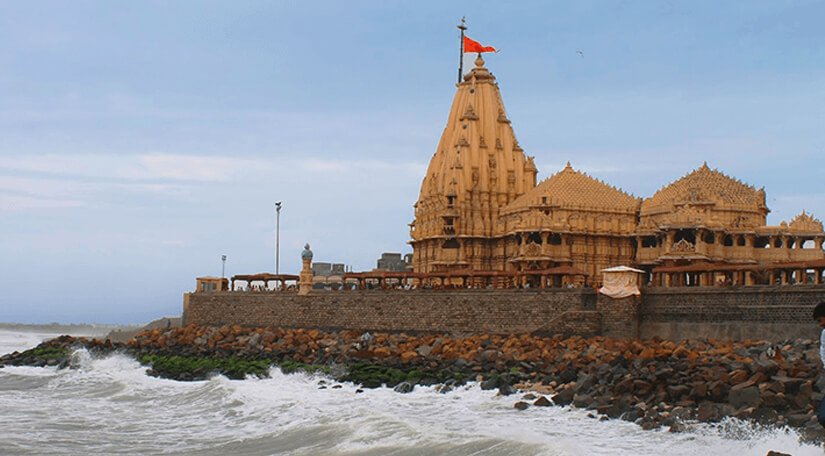
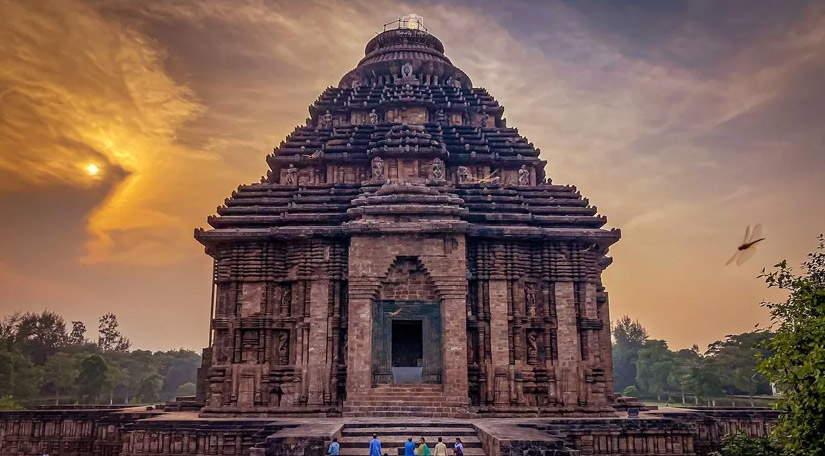
 Dubai
Dubai Malaysia
Malaysia USA
USA





